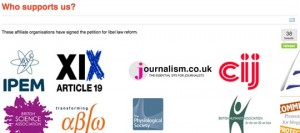At the end of last week, news broke that think-tank MigrationWatch had threatened political commentator Sally Bercow with libel action following comments she made on Sky News in August about a Daily Express story on migration.
Her comments reportedly included reference to what she perceived as the oversimplification of arguments made in the article, which included statistics from MigrationWatch, adding that the story was “fairly dangerous propaganda”, based on case documents posted by author Richard Wilson on his blog.
According to a release from the Libel Reform Campaign, Bercow, who is the wife of House of Commons speaker John Bercow, received a letter from MigrationWatch’s chairman Sir Andrew Green’s solicitors demanding an apology and legal costs as a result of her comments.
Yesterday lawyer David Allen Green announced on his ‘Jack of Kent’ blog that he had been instructed to act in Bercow’s defence to any libel action. Discussing the context of the case he said the current state of free expression is “depressing”.
But our ‘banning’ culture in respect of free expression is not inevitable and can be reversed; there is no good reason why the first reaction of so many people to unwelcome statements is to get the law involved, and then there is no good reason for so many police officers, judges, and officials to allow them to do so.
(…) Sally Bercow could have just quietly apologised, perhaps with the pre-prepared humble apology which was attached to the threatening letter. But she chose not to do so. She has chosen instead to make a stand for her right as a political commentator to respond to news stories in the way she did. She wants to show how threats like this to political commentators – and also journalists – support the need for libel reform.
The case has also been highlighted by the Libel Reform Campaign as what they claim is “proof” of the need for defamation law reform. A new defamation bill is already expected to be drafted in 2011 by the government. Jo Glanville, editor of the Index on Censorship added:
MigrationWatch should not be using our libel laws to silence criticism of their approach over immigration. Sally Bercow now faces the same ordeal as Simon Singh with potentially bankrupting costs, years of her life wasted in Court, all for expressing an opinion. It really presses home just how important the coalition’s pledge of a libel reform bill is.
MigrationWatch had no further comment to make at this time.




